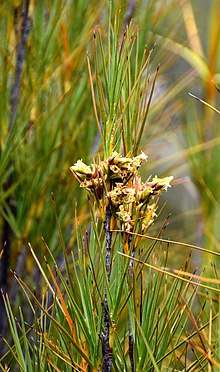Dracophyllum longifolium
Dracophyllum longifolium, commonly called inaka (from Māori), is an upright shrub or small tree in the family Ericaceae that is endemic to New Zealand.
| Dracophyllum longifolium | |
|---|---|
 | |
| Scientific classification | |
| Kingdom: | Plantae |
| Clade: | Tracheophytes |
| Clade: | Angiosperms |
| Clade: | Eudicots |
| Clade: | Asterids |
| Order: | Ericales |
| Family: | Ericaceae |
| Genus: | Dracophyllum |
| Species: | D. longifolium |
| Binomial name | |
| Dracophyllum longifolium | |
| Synonyms[1] | |
|
Dracophyllum lyallii Hook.f. | |
Dracophyllum longifolium grows mostly in the South Island but is found throughout New Zealand from sea level up to 1,200 metres (3,900 ft). Inaka occurs in open forests where it can grow as high as 12 metres and in sub-alpine areas it generally reaches 1–1.5 metres (3 ft 3 in–4 ft 11 in).[3][4]
Dracophyllum longifolium has thin branches that become marked with rings as old leaves die. The needle-like long leaves are 3–5 millimetres (0.12–0.20 in) wide and up to 25 centimetres (9.8 in) long with a pointed tip and are often softly coloured from green through to orange and brown.
Inaka is a long-lived plant and can survive for up to 220 years.[5]
Varieties
This species has the following varieties:[6]
- Dracophyllum longifolium var. longifolium
- Dracophyllum longifolium var. septentrionale
Conservation status
In both 2009 and 2012, D. longifolium var. longifolium was deemed to be "Not Threatened" under the New Zealand Threat Classification System,[7] and this New Zealand classification was reaffirmed in 2018.[8] However, D. longifolium var. septentrionale was classified as "At Risk - Naturally Uncommon" in 2012,[9] and in 2018.[8]
References
- "Dracophyllum longifolium (J.R.Forst. & G.Forst.) R.Br. ex Roem. & Schult. | Plants of the World Online | Kew Science". Plants of the World Online. Retrieved 5 March 2020.
- Brown, R. (1819). Roemer, J.J.; Schultes, J.A. (eds.). "Dracophyllum longifolium". Systema Vegetabilium Edn. 16. 4: 385.
- "Dracophyllum longifolium". www.nzflora.info. Retrieved 16 May 2019.
- Metcalf, Lawrie. "Dracophyllum longifolium". www.rnzih.org.nz. Retrieved 16 May 2019.
- Scheele, Sue; Sweetapple, Peter. "Neinei and Inanga". www.landcareresearch.co.nz. Manaaki Whenua Landcare Research. Retrieved 16 May 2019.
- Eagle, Audrey (2008). Eagle's complete trees and shrubs of New Zealand volume two. Wellington: Te Papa Press. pp. 576–578. ISBN 9780909010089.
- "Dracophyllum longifolium var. longifolium | New Zealand Plant Conservation Network". nzpcn.org.nz. Retrieved 5 March 2020.
- de Lange, P.J.; Rolfe, J.R.; Barkla, J.W.; Courtney, S.P.; Champion, P.D.; Perrie, L.R.; Beadel, S.M.; Ford, K.A.; Breitwieser, I.; Schönberger, .; Hindmarsh-Walls, R. (1 May 2018). "Conservation status of New Zealand indigenous vascular plants, 2017" (PDF). New Zealand Threat Classification Series. 22: 43, 62. OCLC 1041649797.CS1 maint: numeric names: authors list (link)
- "Dracophyllum longifolium var. septentrionale | New Zealand Plant Conservation Network". nzpcn.org.nz. Retrieved 5 March 2020.